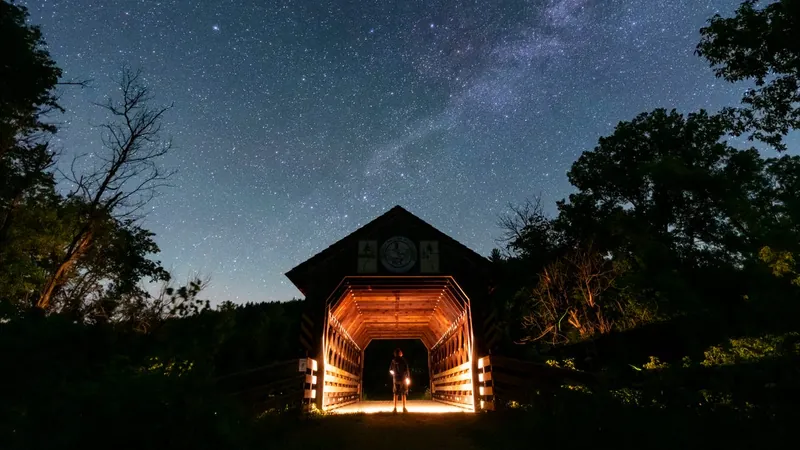
A Second Dark Sky Park in Wisconsin Slips Away Amid Rising Light Pollution: What’s Next?
2024-10-08
Author: Chun
Introduction
In April 2021, John Heasley, an astronomy educator, embarked on an important quest to assess the night sky's darkness in Vernon County, located in southwestern Wisconsin. He measured the sky brightness across three public recreational areas: Wildcat Mountain State Park, the Kickapoo Valley Reserve, and Tunnelville Cliffs State Natural Area. He was thrilled with the results, which indicated the night sky was sufficiently dark to qualify for the prestigious designation of an International Dark Sky Park—a title that signifies exceptional stewardship of the night sky and attracts visitors eager to bask in the beauty of the cosmos.
A Dimming Hope
However, by fall 2023, those hopes had dimmed. Heasley's latest measurements revealed a shocking increase in sky brightness—by 50% or more in some areas—rendering the locations too luminous to qualify for the designation. "It was a blow. It was a disappointment," Heasley expressed. “We had done so much work to create this international dark sky park.”
The Impact of LED Lights
The primary offender appears to be the growing adoption of LED streetlights, which many communities worldwide are implementing for their energy efficiency and longevity. But research suggests that while energy-saving, the harsh, blue-toned light emitted by these LEDs can brighten the night sky significantly—some studies propose an increase of about 10% per year in light pollution. This escalation in brightness not only sabotages stargazing but also disrupts the natural nighttime rhythms of both wildlife and humans, posing potential health risks.
Current Dark Sky Certifications
The International Dark Sky Association (IDSA) has been certifying dark sky places since 2001, with over 200 certified locations worldwide, encompassing more than 61,000 square miles of protected night sky across 22 countries. While Wisconsin currently claims only one dark sky park—Newport State Park in Door County—efforts were underway to establish a second.
Challenges Ahead
However, the path is fraught with challenges. To qualify for dark sky park status, sites must implement strict educational programs promoting awareness of light pollution and often require drastic changes to existing outdoor lighting fixtures. In their endeavors, Heasley and local power engineer Scott Lind have managed to upgrade lighting at Kickapoo Valley Reserve and Wildcat Mountain State Park, transitioning roughly 60 fixtures to restrict light pollution. Notably, Tunnelville Cliffs has remained free of artificial lighting.
The Role of Neighboring Towns
Yet, the increasing brightness from neighboring towns, which are rapidly replacing traditional streetlights with LEDs, poses a significant hurdle. Despite efforts from nearby communities such as Ontario—where officials opted for lower-temperature LED bulbs to mitigate light pollution—the overall impact remains considerable. Lind noted findings from a National Park Service study in Washington state's Chelan County, which revealed a dramatic 60% increase in sky glow following their switch to LED lights. Since light pollution can travel vast distances, even distant municipalities may be contributing to the light encroachment issue.
A Commitment to Preservation
Despite the setback, Heasley and Lind remain committed to preserving the night sky. They are now focused on proactively engaging other communities that have yet to transition to LEDs, encouraging them to adopt lower-temperature fixtures when the time arises, ideally around 2200 Kelvin. Additionally, they are advocating for initiatives that include dimming or turning off unnecessary outdoor lighting.
Community Engagement
To elevate public awareness about light pollution and its impact, they have initiated a new group, DarkSky Wisconsin, which aims to work collaboratively with municipalities to draft regulations that protect the night skies. Heasley remains optimistic, encouraging the community that while the attainment of dark sky park status may be elusive, the stunning celestial displays are still within reach. "Starry skies await you in Vernon County along the Kickapoo River," he asserts, reminding us all of the continuous effort needed to keep our skies dark and inviting for future generations.





 Brasil (PT)
Brasil (PT)
 Canada (EN)
Canada (EN)
 Chile (ES)
Chile (ES)
 España (ES)
España (ES)
 France (FR)
France (FR)
 Hong Kong (EN)
Hong Kong (EN)
 Italia (IT)
Italia (IT)
 日本 (JA)
日本 (JA)
 Magyarország (HU)
Magyarország (HU)
 Norge (NO)
Norge (NO)
 Polska (PL)
Polska (PL)
 Schweiz (DE)
Schweiz (DE)
 Singapore (EN)
Singapore (EN)
 Sverige (SV)
Sverige (SV)
 Suomi (FI)
Suomi (FI)
 Türkiye (TR)
Türkiye (TR)